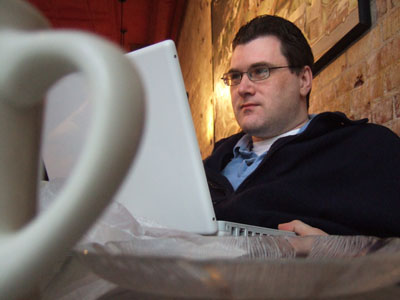Appalachian Institute of Digital Evidence First Annual Conference
Appalachian Institute of Digital Evidence
First Annual Conference
July 27- 30, 2010
Marshall University Forensic Science Center
Seating is limited. To reserve a seat, email John Sammons at sammons17@marshall.edu with name, agency and contact information.
July 27 - 0800 to 1600 Cyber Security & Network Forensics
Schedule coming soon!
July 28 - 0800 to 1600 Law Enforcement
Today's Smoking Gun: An Introduction to Digital Evidence
John Sammons, Assistant Professor, Marshall University
Are you leaving evidence behind? Computers are everywhere and as such, they need to be considered as a vital source of potential evidence. Valuable digital evidence may be discovered in nearly any case, not just child pornography and identity theft. Homicide, robbery, drug violations are just a few of the cases that could be solved with digital evidence.
In this course learn the fundamentals of digital evidence, how it's different, how it's collected and how it could benefit your investigations.
Internet Investigations
Josh Brunty
Marshall University Forensic Science Center
Investigating a cybercrime and/or cybercriminal can be one of the most complex tasks facing the law enforcement professional today and requires a multidisciplinary approach supported by technical expertise that was once not needed with traditional crime. This session will focus on investigations and operations centered on the use of the internet and its many communities that are being exploited for criminal activity.
This session will teach investigators how to retrieve and/or extract such evidence using a variety of tools and techniques.
These two classes have already been submitted and approved for LET credit (4 hrs per).
July 29 0800 – 1600 – Digital Forensics
Windows 7 Forensics and USB Device Tracking
This technically intensive class is designed for the experienced digital forensic investigator. This class will provide an introduction to the Windows 7 operating system from a forensic standpoint. It will also cover the techniques used to track USB devices. The course is taught by Dustin Hurlbut, an Instructor from AccessData. AccessData is the world's largest provider of digital forensic software.
NOTE: LET credit approval pending
July 30 0800 – 1600 – Electronic Discovery
“Zubulake Revisited” - 2010 Guidance on Preservation Obligations and Spoliation
Douglas Crouse
(50 min.)
Tips For Developing an E-Discovery Response Action Plan
Matthew A. Kelly
(50 min.)
“Cull,” “Image,” “Early Case Assessment,” and Other Key Vocabulary
Jill McIntyre
(25 min.)
How to Assess Reasonable Accessibility
Jill McIntyre
(25 min.)
eDiscovery Collection
Dustin Hurlbut
(50 min.)
eDiscovery Analysis
Dustin Hurlbut
(50 min.)
Reforms of Civil Pretrial Discovery on the Horizon
Jill McIntyre
(50 min.)
Data as Evidence: Issues Governing the Admissibility of Electronically
Stored Information at Trial and in Summary Judgment Practice
Douglas Crouse
(50 min.)
Controlling E-Discovery Costs in Litigation
Jill McIntyre
(50 min.)
First Annual Conference
July 27- 30, 2010
Marshall University Forensic Science Center
Seating is limited. To reserve a seat, email John Sammons at sammons17@marshall.edu with name, agency and contact information.
July 27 - 0800 to 1600 Cyber Security & Network Forensics
Schedule coming soon!
July 28 - 0800 to 1600 Law Enforcement
Today's Smoking Gun: An Introduction to Digital Evidence
John Sammons, Assistant Professor, Marshall University
Are you leaving evidence behind? Computers are everywhere and as such, they need to be considered as a vital source of potential evidence. Valuable digital evidence may be discovered in nearly any case, not just child pornography and identity theft. Homicide, robbery, drug violations are just a few of the cases that could be solved with digital evidence.
In this course learn the fundamentals of digital evidence, how it's different, how it's collected and how it could benefit your investigations.
Internet Investigations
Josh Brunty
Marshall University Forensic Science Center
Investigating a cybercrime and/or cybercriminal can be one of the most complex tasks facing the law enforcement professional today and requires a multidisciplinary approach supported by technical expertise that was once not needed with traditional crime. This session will focus on investigations and operations centered on the use of the internet and its many communities that are being exploited for criminal activity.
This session will teach investigators how to retrieve and/or extract such evidence using a variety of tools and techniques.
These two classes have already been submitted and approved for LET credit (4 hrs per).
July 29 0800 – 1600 – Digital Forensics
Windows 7 Forensics and USB Device Tracking
This technically intensive class is designed for the experienced digital forensic investigator. This class will provide an introduction to the Windows 7 operating system from a forensic standpoint. It will also cover the techniques used to track USB devices. The course is taught by Dustin Hurlbut, an Instructor from AccessData. AccessData is the world's largest provider of digital forensic software.
NOTE: LET credit approval pending
July 30 0800 – 1600 – Electronic Discovery
“Zubulake Revisited” - 2010 Guidance on Preservation Obligations and Spoliation
Douglas Crouse
(50 min.)
Tips For Developing an E-Discovery Response Action Plan
Matthew A. Kelly
(50 min.)
“Cull,” “Image,” “Early Case Assessment,” and Other Key Vocabulary
Jill McIntyre
(25 min.)
How to Assess Reasonable Accessibility
Jill McIntyre
(25 min.)
eDiscovery Collection
Dustin Hurlbut
(50 min.)
eDiscovery Analysis
Dustin Hurlbut
(50 min.)
Reforms of Civil Pretrial Discovery on the Horizon
Jill McIntyre
(50 min.)
Data as Evidence: Issues Governing the Admissibility of Electronically
Stored Information at Trial and in Summary Judgment Practice
Douglas Crouse
(50 min.)
Controlling E-Discovery Costs in Litigation
Jill McIntyre
(50 min.)
Labels: Appalachian Institute of Digital Evidence, Cyber Security, Digital Evidence, Electronic Discovery, Internet Investigations, John Sammons, Network Forensics


0 Comments:
Post a Comment
<< Home